How do you say Grandmother in Polish?
Or better yet Jak rozpętałam trzecią wojnę światową (How I started WW3). This question of how to say grandmother in Polish is very controversial amongst folks with Polish heritage and local Poles. Just check out any social media group where this question frequently gets asked. Those posts easily rack up hundreds of comments ranging from the innocuous to the nasty. Polonia are often accused of a lack of respect for their culture, language, and heritage, while Poles are accused of gatekeeping who or what is Polish. You know they say gdzie dwóch Polaków, tam trzy zdania – where there are two Poles, there are three opinions. Maybe it’s just part of our culture 😉
So what’s the answer to how to say grandmother in Polish?
Grandmother in Polish is babcia, pronounced /ˈbap.t͡ɕa/. Take a listen here https://en.wiktionary.org/wiki/File:Pl-babcia.ogg
Babcia is how to say Grandmother in Polish.
What’s all the hubbub then over a seemingly simple question with a simple answer? That’s where the word busia comes into play.
What about Busia?
Yes, what about Busia? In all the discussion over how to say grandmother in Polish, the number one argument of Polish speakers in Poland is that Busia is not Polish. They claim that it is an exclusively Polonia creation and not a Polish word.
Well, is it? Is Busia a Polish word? Yes, Busia is a Polish word meaning grandmother in gwara (dialects), but it is not what Poles call their grandmas.
Now hear me out.
If the question is how to say grandmother in Polish, the definitive answer is Babcia. That’s what Polish people in Poland call their grandmothers. That is the standard word in the Polish language. But if the question is if the word Busia is Polish, meaning from Poland, the answer most certainly is yes, despite the fact that nobody in Poland calls their grandmother Busia.
Who calls their grandmother Busia?
The majority of the people who call their grandma Busia would be Polonia, specifically Polish Americans, but not only. How did that come to be? We’ll get into that a little bit later. Who else calls their grandma Busia – well, anyone who uses Polish gwara for example Gwara krajeńska, but not only. Want to know more about that? Check here.
Some more indications of use in gwara https://kramsko.pl.tl/Kramska-gwara.htm?fbclid=IwAR0jtVW7TM6lUf-aQFJgmTn2cfhhpHwyzQ098nhkqha77XmXUFGlU26mP5M
Here with a lovely poem about grandmother using Busia
Some words from the author of the poem https://kociewie24.eu/tworca/elzbieta-pasterska/
The poem by Elżbieta Pasterska:
MOJA BUSIA
Moja busia to gosposia
durcham Jó o wiancy prosza.
Zawdy wszysko mnie smakuje,
co z ochoto wciósz gotuje:
I czarlina, kartoflanka
ulubióna zupa Janka
I kapusta szmurowana
w nos mój lejci usz od rana.
Szandar tysz sie zdarzy czasym,
posmaruje chlyb z okrasó.
I ruchanki, kuch młodziowy
w busi ryncach wnet gotowy,
zupa z brzadu, kómpot z bani
To kociewske specyjały!
Let’s check the receipts
We can find several words for woman, young woman, old woman, mother, grandmother, great-grandmother in the modern and old dictionaries as well as in dialect dictionaries. As you can see – baba, babka, babcia, babusia, babunia etc. are all there with several meanings.
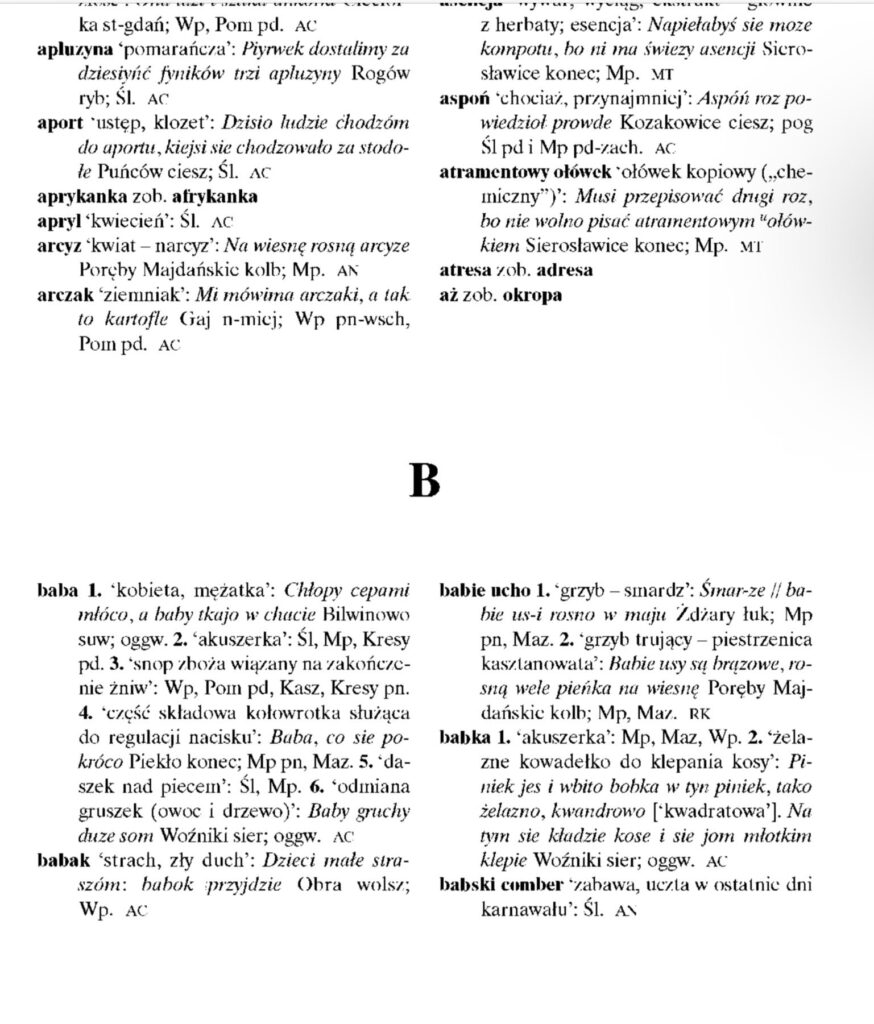

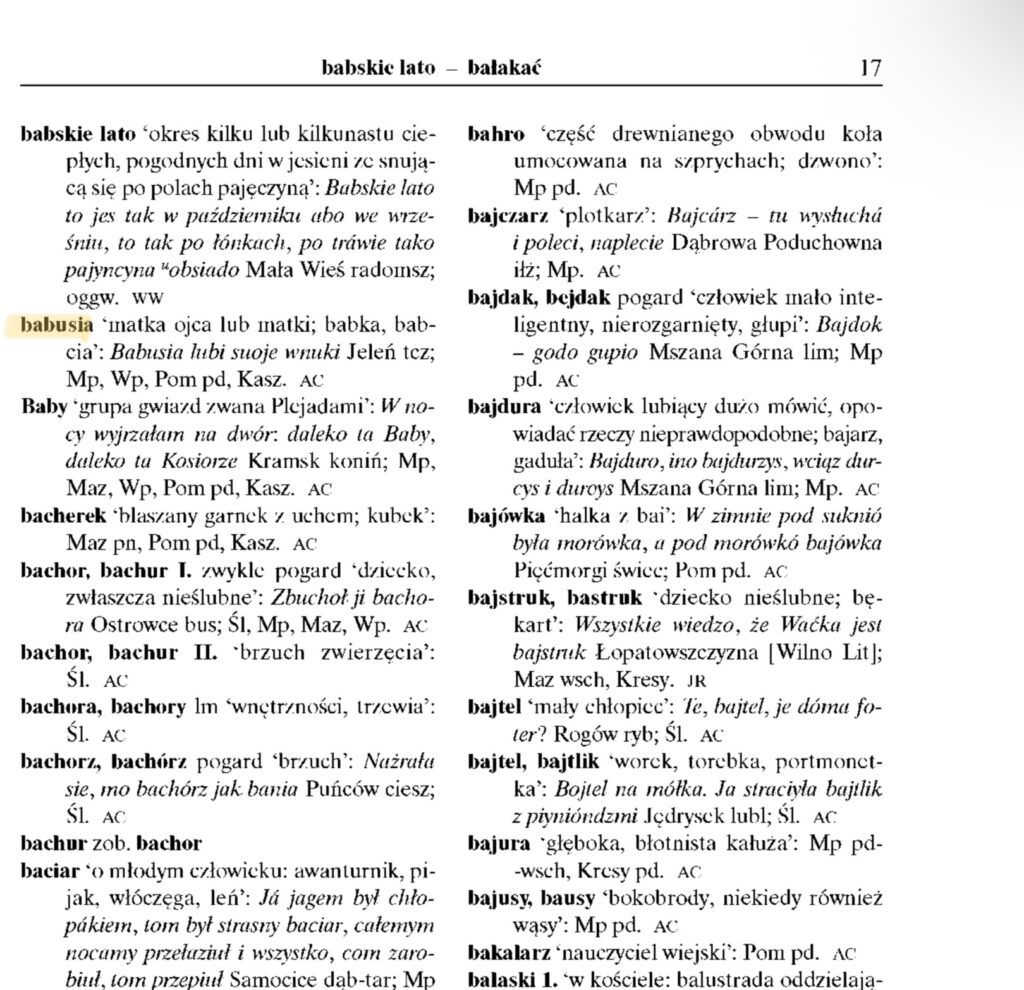
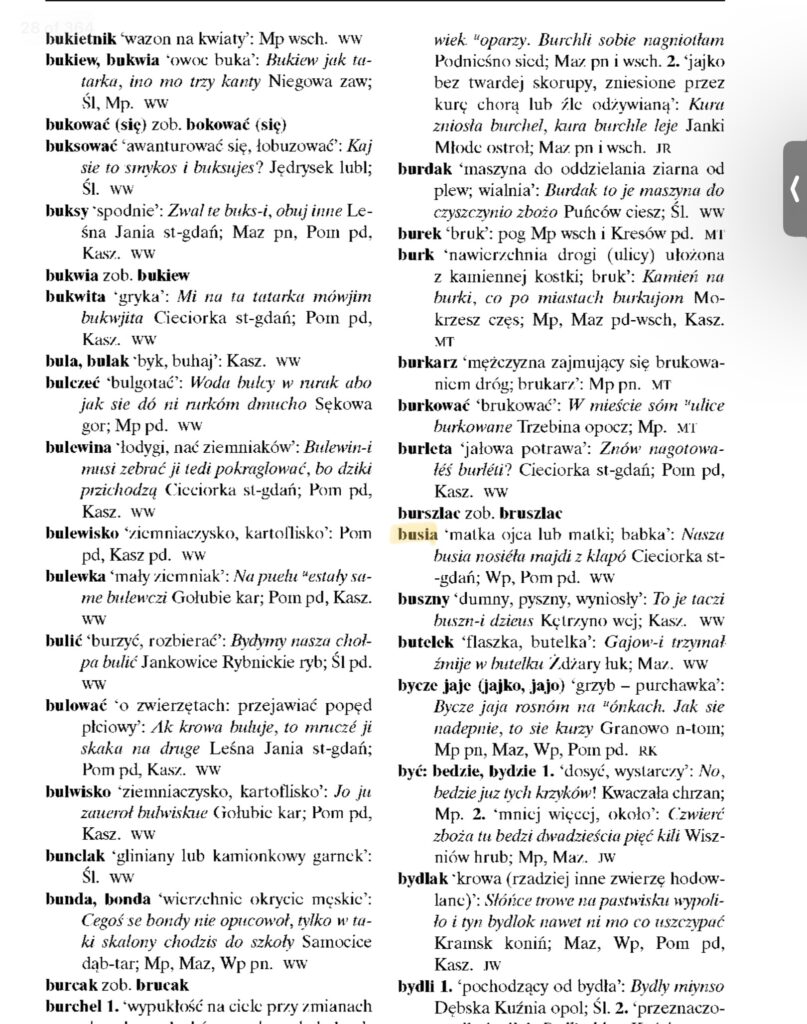
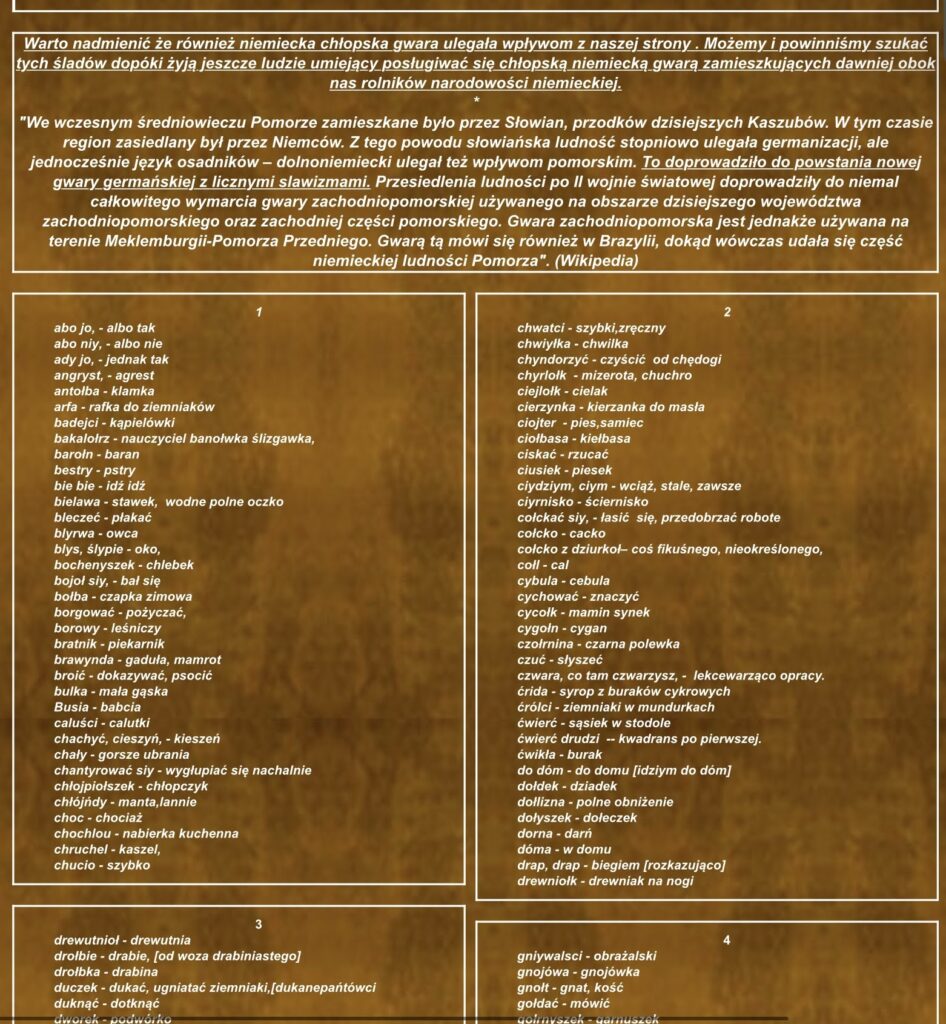
Babcia is the term that has held on in Poland, while it seems Busia is the favored term with Polonia or at least American Polonia. That being said, Busia is a gwara word for grandmother, and it is not commonly used in Poland. Busia is so uncommonly used that most Poles would go as far to say that it isn’t Polish. It originates in Poland, but is virtually unknown these days. It can be found in the excerpts shared here as well as in the links of the sources. These are glossaries of gwara and one specifically krajenska gwara. You can even order a book entitled Opowiedz mi busiu, a collection of poetry. The title translates to Tell me grandma or Tell me busia.

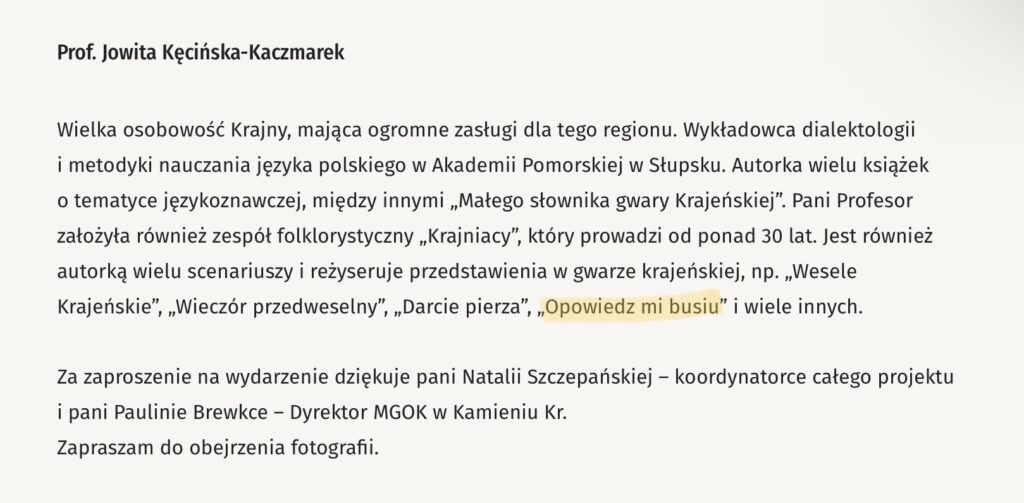
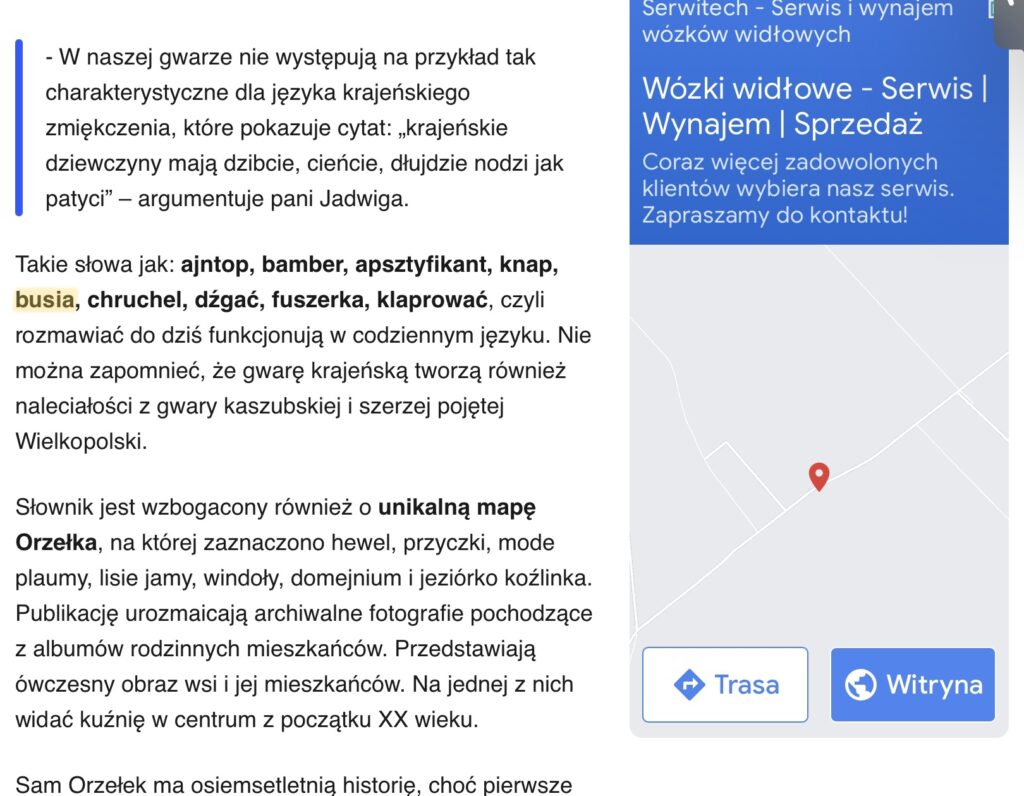
Busia makes perfect sense as a shortened form of babusia. I am surprised Bunia never caught on from babunia. It’s my favorite one. I think Bunia is quite catchy. It is conceivable that Polonia either shortened babusia to get busia which I must admit, sounds quite sweet. Or that a large community of people speaking gwara popularized busia in the US and other Polonia communities. Either way, we people living in Poland have to admit that while busia is strange for us, it is in fact Polish.
How many people still use the word Busia or at least recognize the word as grandmother? I do not know. I would have to do research on the topic. Let’s just say that if I walked around my village and asked the local kids where their Babcia was, they’d understand me. If I asked them where their Busia was, they would not.
What about Babci?
Well, sorry Polonia, you are going to have to come to terms with the fact that this one stems from a mistake. Most likely after hearing things like Idziemy do babci (We are going to Babcia’s) all your life, the word babci just stuck. It is simply a conjugation form of babcia and not a proper noun for grandmother. My kids go the extra bilingual mile and say we are going to Babci’s 😉
All the forms can be found here https://odmiana.net/odmiana-przez-przypadki-rzeczownika-babcia
So what about those Polonia especially in America?
I agree with the opinion that respecting culture means getting to know culture and language. Keeping the “other” culture alive takes a lot of work. As the generations go by, it gets harder and harder. And just imagine immigrants of years gone by and how difficult it was for them to maintain a link with their home country. Add to that a desire many had to fully assimilate into their new culture and that’s a recipe for losing your precious roots.
Where do I fit in?
I am an American without Polish descent (well, very tenuous heritage far, far back), but I have lived in Poland for over twenty years. I didn’t choose to live in Poland to enrich my heritage or anything like that. Polish heritage was not a part of my life before moving here. But here I am anyways. My husband is Polish. My children have dual citizenship and are fully bilingual. They have been to the US three times only for short visits. I think if I asked them they would identify themselves strictly as Poles. And that’s ok. They are very culturally conscious, but their Americanness only comes from me – their mother – and popular culture.
Maybe I have neglected my responsibility of teaching my children about my culture. Recently, I was asked to consider teaching a kind of “American school” for some American kids living in Poland, just like the weekend “Polish school” some of you may remember from your childhood. Will I do it? I don’t know. This is stuff I am more than capable of teaching. I even have the materials. But at the same time, it’s stuff I haven’t taught my own kids. I have taught them my language of course and some cultural things that are important to me and my family, but that is it.
Add some spice
In my opinion, many Americans view their own culture as default, serving as a generic background for their cultural heritage (however strong or weak) which serves as a spice to the plain old American culture. Perhaps I have fallen into the trap of thinking my American culture is some kind of generic default with the Polish culture as the more worthwhile spicy part. Am I wrong to think that many Americans view their cultural heritage in that way? When they say I am a Polish American or I am an Italian American, etc. it is the “other” which sets them apart from the base American. Or maybe I have gone too far with my conclusions. Contrary to popular belief, America does have a culture. While Poland is not only kiełbasa and pierogi, America is not only hameryka and idiocy.
In the case of Polonia, we are often talking about generations of Poles quite detached from Poland. While some people carried on teaching their children the language, sending the children to relatives in Poland every summer, cultivating heritage, and keeping up with modern events, many did not. And that’s ok. I do know some Polonia who are stuck on the motherland concept and have a hard time with the concept of Poland as it is now, a modern country.
Despite the complaining we do in Poland, Poland is a modern country. I can order my sushi here using an app, drive there in my hybrid vehicle, pay for parking with my phone, text the restaurant that I’ve arrived, and pay for food with my eye. I can also eat schabowy z ziemniakami i mizerią at a milk bar. That’s Poland.
The End
I hope this goes some way to clear up any confusion with how to say grandmother in Polish. If you still have a grandmother give her an extra hug today, and if you are a grandmother I wish you sto lat Babciu!
Useful links
A small glossary of gwara
http://stara-wisniewka.manifo.com/gwara
Mały Słownik Gwar Polskich http://rcin.org.pl/Content/64154/MA%C5%81Y%20S%C5%81OWNIK%20GWAR%20POLSKICH%20(OCR).pdf?fbclid=IwAR0j5yB5-eewgvINZbHN1toP-haHJ6YaI-8noXKm9XyAlWnlgfWTJcGXniM
Słownictwo polszczyzny gwarowej na Brasławszczyźnie
Słowniczka gwary lokalnej „Jak nasi przodkowie w ŁORZOŁKU godali”
Want to read more about the Polish – Polish/American identity? Check out this post by Ms. Sanders, exploring what it means to be a “Plywood Pole”.

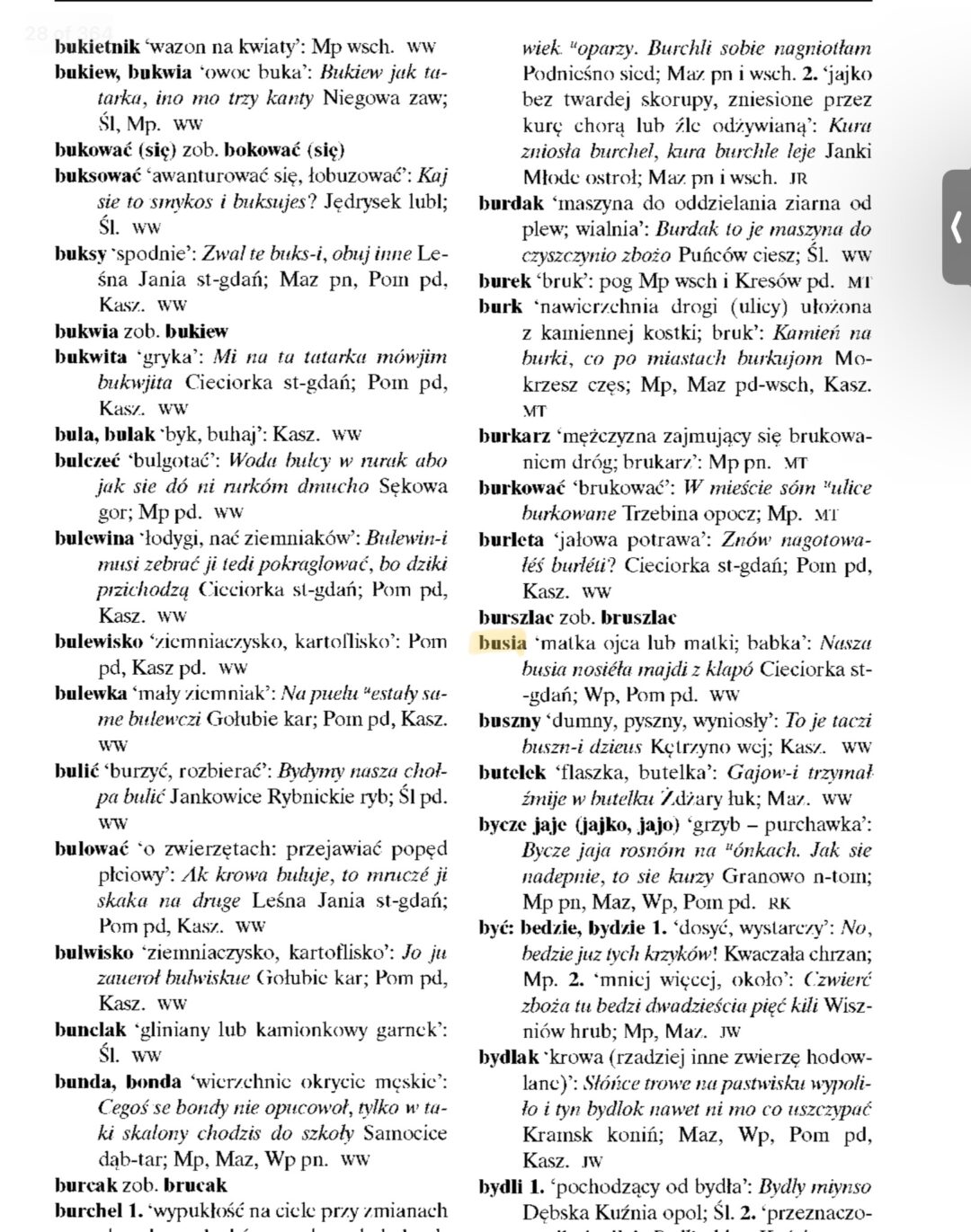

14 Comments
Terri Shulda
July 30, 2022 at 10:20 pmI’m a first generation Polish American and called my grandmas babcia. My husband is second generation and called his grandma busia. I always told him that was not correct
and that it was a made up word. Lol
Chris
July 31, 2022 at 8:17 amHi Terri. You don’t have to tell him. We can keep it between you and me 😉
agniecha
July 31, 2022 at 5:58 amYou write so little, dear Chris, that when you do, I am happy to read doesn’t matter what. So give me a chance to read more. Otherwise I will call you “babcia”. 😀 ( next time that you post something, 20 years later ).
Chris
July 31, 2022 at 8:19 amAgniecha, thank you 🙂 I really planned to write more and more often, but you know, life. Also I am not that brand new immigrant in Poland anymore. I’m getting more and more Polish everyday.
Agata
December 10, 2022 at 7:17 pmGrammi (a Gummi Bear) is ‘Bunia’ in Polish 🙂
Edmund Labuz
August 15, 2023 at 6:15 amMy Parents and Grandparents came to the US. 1920 All of us First generation were taught to call Grandma BUSIA.and we did!…
Liz Holder
January 21, 2024 at 7:20 amI am first generation American. Both parents are Polish. I called my grandmother Babcock, but all of the very American children in my family call their polish grandmother Babi: perhaps to be more modern? Or perhaps because the nonpolish partners in our extended family relate to Babi better than Babchia.
Kathy Furgal
February 5, 2023 at 2:13 pmAs 2nd generation Polish I grew up saying Busia and my fully Polish grandmother always responded with a smile. I am pleased to be called Busia now.
Chris
February 27, 2023 at 7:15 pmAs you should be! It’s an honor 🙂
S Sanders
January 20, 2024 at 5:38 pmThis was an extremely helpful and useful article. I would love it if you posted the link in the comment section under my Plywood Pole post on my blog. It informs the conversation! https://talkinglikeasausage.wordpress.com/2023/08/02/so-now-i-am-a-plywood-pole/
Chris
January 21, 2024 at 7:53 pmI added it to the end of the post with a short introduction. Let me know if I have characterized it correctly. I didn’t include your full name as I couldn’t find it on your blog, so you are the mysterious Ms. Sanders 🙂
Cyndi
January 21, 2024 at 3:05 amMy great grandmother we call Bunia, what is the story with Babunia?, which part of Poland did that come from?
Chris
January 21, 2024 at 7:51 pmIt’s just a sweet diminutive of grandma. It’s not a dialect or strictly connected to any region. This formation can be used for other words for example with mama as mamunia 🙂
D
March 21, 2024 at 9:28 pmBunia is more common than “busia”. Still rare, but it’s still at least heard of.
Bunia is a shorter form of babunia.